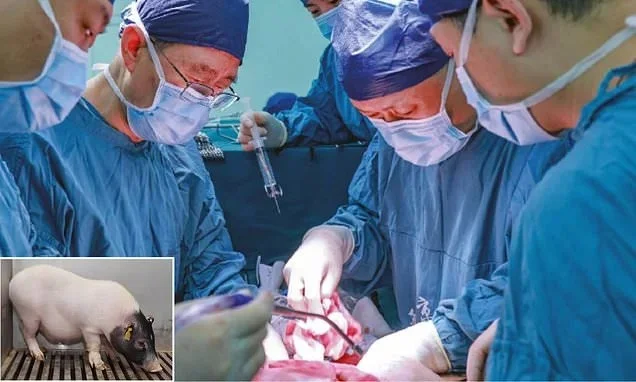China has set a medical milestone after doctors at Anhui Medical University’s First Affiliated Hospital successfully performed the world’s first transplant of a pig liver into a human.
Groundbreaking Operation
In May 2024, a 71-year-old man battling hepatitis B and liver cancer received a genetically modified pig liver. He had been deemed unfit for a human donor organ, prompting doctors to attempt the pioneering xenotransplant procedure.
Genetic Engineering Behind the Surgery
The donor organ came from an 11-month-old Diannan miniature pig whose genes were edited to minimize immune rejection and clotting complications. These alterations made the liver more compatible with the patient’s body.
Early Function and Recovery
For the first few weeks, the transplanted liver worked efficiently, producing bile and essential proteins. The absence of immediate rejection gave scientists hope that animal-to-human transplants could become a practical option for patients waiting for organs.
Complications After One Month
After 38 days, doctors detected xenotransplantation-related thrombotic microangiopathy, an immune disorder that damages blood vessels. Despite intensive care, the patient later died from internal bleeding on day 171 of the procedure.
Record Survival Time
The patient’s survival period of 171 days represents the longest recorded lifespan following a pig liver transplant. Lead researcher Professor Beicheng Sun described it as “a vital step forward” in proving that genetically modified animal organs can sustain human life for months.
Hope for Future Organ Shortages
Experts believe xenotransplantation could ease global organ scarcity. In China alone, more than 6,000 patients await liver transplants each year, and pig organs may help bridge that gap.
Why Scientists Use Pigs
Pigs’ organs are similar to human ones in size and function. Through genetic editing, researchers can limit rejection reactions, making pigs the preferred species for experimental transplants.
Challenges Ahead
However, immune response and blood-clotting complications still threaten long-term success. “We need deeper understanding of the body’s reaction to animal tissues,” Sun explained. Continued trials will refine safety before routine clinical use.
Global Research Momentum
China’s work follows breakthroughs abroad. In the United States, a pig heart transplant extended a man’s life for two months in 2022, and a pig kidney transplant achieved similar survival in 2024. Each experiment moves science closer to reliable animal-organ transplants.
Outlook for Transplant Medicine
The success in Anhui demonstrates that genetically modified pig livers can sustain human function for long periods. With continued innovation, researchers predict clinical use by 2027, offering hope to thousands awaiting lifesaving organs.
__________________________________________________






